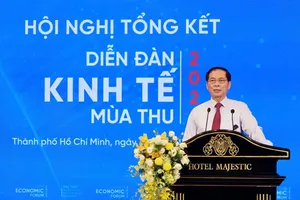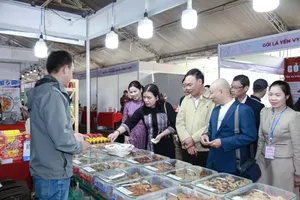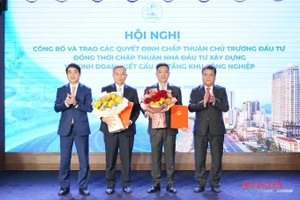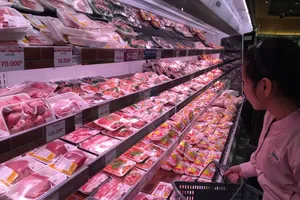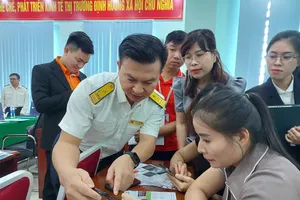 |
Minister of Environment and Natural Resources Dang Quoc Khanh (first from left ), SBV Governor Nguyen Thi Hong (second from left) and US Secretary of the Treasury Janet Yellen (second from right) at the meeting in Hanoi on July 21. (Photo: nhandan.vn) |
The event was part of an official visit to Vietnam by US Secretary of the Treasury Janet Yellen.
Speakers at the meeting pointed out that the world economy is still facing numerous difficulties in the post-Covid-19 pandemic period, including high and persistent inflation, the trend of tightening monetary policies, disrupted supply chains, growth slowdown, and recession risks.
Besides, countries also have had to cope with challenges posed by climate change. These problems have been negatively affecting enterprises' production and business activities as well as people’s life quality, they said.
SBV Governor Nguyen Thi Hong said the central bank of Vietnam is always steadfast in the target of controlling inflation, stabilising the macro-economy, and ensuring safety for the banking system.
To that end, it has kept a close watch on the situation, proactively used measures and tools at appropriate levels and points of time, identified the focus of each period to take suitable actions, and closely coordinated the monetary policy with the fiscal and other macro-economic policies.
Meanwhile, Yellen said the US is pursuing policy priorities that aims to strengthen the resilience of supply chains and promote strong and comprehensive growth, and that it is ready to cooperate with Vietnam to overcome challenges and develop their economies.
Talking about climate change response measures, Vietnamese Minister of Natural Resources and Environment Dang Quoc Khanh described climate change as an irreversible trend and the most serious challenge to humanity at present. Climate change response therefore is becoming one of the priorities of all development decisions in the world.
As one of the countries hit hardest by climate change, Vietnam has played an active and responsible role in reducing greenhouse gas emissions and adapting to this global phenomenon. It has also taken steps to adopt a green development model. The country made a commitment to achieving net zero emissions by 2050 at the 26th UN Climate Change Conference (COP26) and recently approved a political declaration on the establishment of the Just Energy Transition Partnership (JETP) with G7 and non-G7 partners, he went on.
Yellen held that to minimise adverse impacts of climate change, countries will need a lot of time and resources, adding the US attaches importance to the role of multilateral development banks (MDBs) and the private sector in mobilising finance for climate change response projects and programmes.
Meanwhile, Hong noted as an important source of finance for the economy, the banking sector of Vietnam is always aware of its role in providing funding for the realisation of the Sustainable Development Goals. She shared Yellen’s view that countries can diversify capital sources for “green” projects through MDBs like the World Bank (WB) and the Asian Development Bank (ADB) to use long-term loans with reasonable costs to resolve climate change challenges.
The meeting, which attracted over 300 participants including many female officials and FTU students, affirmed women’s role and attention as well as young people’s awareness and determination to join hands to cope with such global challenges as climate change to achieve a greener society and a sustainable and prosperous future for all.






